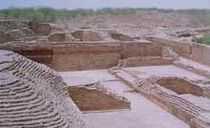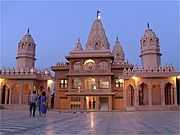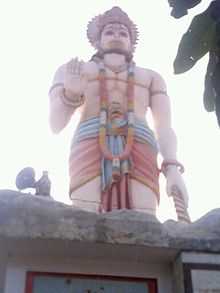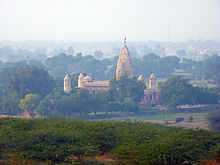Agroha (town)
| Agroha | |
|---|---|
| town | |
 Agroha | |
| Coordinates: 29°20′N 75°38′E / 29.33°N 75.63°ECoordinates: 29°20′N 75°38′E / 29.33°N 75.63°E | |
| Country | India |
| State | Haryana |
| Languages | |
| • Official | Hindi |
| Time zone | IST (UTC+5:30) |
Agroha (29.20 N 75.38 E) is an ancient town in Haryana in what is now Northern India, believed to be the birthplace of the Agarwal and Agrahari communities. Ancient structures, pot-shards, coins and seals have been found in archaeological excavations. Agroha was the capital of legendary Emperor Agrasen with ideology of "One brick one rupee".
It is situated in Hisar district in between Hisar city and Fatehabad on NH 10.
Early history

Agroha remained an important centre of commerce and political activity till the period of Feroze Shah Tughluq as it was situated on the ancient trade route between Taxila and Mathura. Earlier excavations proved the potentiality of the site and its ancient name 'Agrodaka', headquarters of a Janapada.
The Agroha mound goes back to the 3rd century BC and is where Harappan coins were discovered apart from stone sculptures, terracotta seals, iron and copper implements, shells and a host of other things.
Recent excavations have yielded five cultural periods ranging from circa fourth century to fourteenth century AD. The excavations have also revealed two ancient shrines namely a Buddhist stupa and a Hindu temple.
Demographics
As of 2011 India census, Agroha had a population of 7722 in 1491 households. Males (4068) constitute 52.68% of the population and females (3654) 47.31%. Agroha has an average literacy (4522) rate of 58.55%, less than the national average of 74%: male literacy (2659) is 58.8%, and female literacy (1863) is 41.19%. In Agroha, 13.71% of the population is under 6 years of age (1059).[1]
Recent times
- See: Agroha Dham



In 1976, the then Chief Minister of Haryana Banarsi Das Gupta started the development of Agroha under the banner of "Agroha Vikas Trust". A huge Temple of Maharaja Agrasen, Mata Lakshmi (Kuldevi of Agarwal and traders community) and Mata Saraswati was constructed there and which was inaugurated Rajiv Gandhi.
Subsequently, Banarsi Das Gupta's initiatives led to the formation of Agroha Development Board. In first ever meeting, a decision was taken that in the name of Maharaja Agrasen “Maharaja Agrasen Medical College” will be established in Agroha. It was Shri Gupta’s persistence that the Haryana Government released 267 acres of land to the Agarwal Society for the Medical College, for just Re. 1 in lease. The Government also make an agreement with the society under which the Government decided to bear 50% of the development amount, and to hand over the managements to the Agarwal Society while contributing 99% of the maintenance fee; once the Medical College is developed. The remaining 1% is to be borne by the Agarwal Society. It was this agreement which increased the momentum of the development of the Medical College and the AGROHA.
During the last 20 years Agroha Vikas Trust has done a lot of development of this Holy town, and a modern lodging and boarding facility is now available. A number of temples have been constructed in the Complex, including the Sheetla mata temple and Hanuman temple.
A Medical and Engineering college is also present at Agroha.
Famous residents
- Agroha is the birthplace of best wrestler of India Geetika Jakhar who won silver medal at Asian Games held at Doha in 2006.
- Agroha is the birthplace of the athlete Krishna Poonia who won gold medal in the discus throw in the Commonwealth Games 2010 held in Delhi.
See also
| Wikimedia Commons has media related to Agroha (town). |
References
- ↑ "Census of India 2011". Retrieved 12 March 2014.